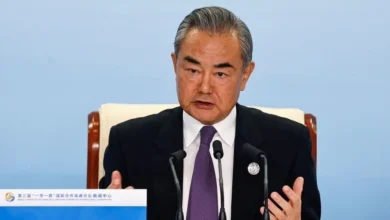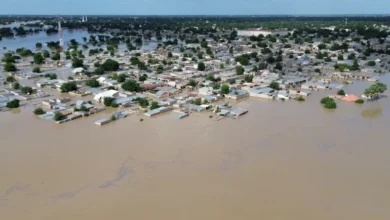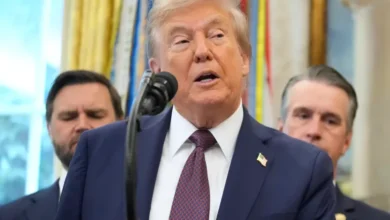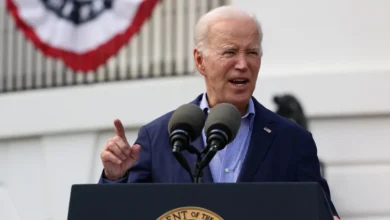Key takeaways from Trump’s speech at the Republican National Convention
Six days after surviving an assassination attempt, former United States President Donald Trump took the stage at the Republican National Convention to accept the party nomination for the presidency.
He went on to speak for more than 90 minutes – the longest acceptance speech in modern history.
What was meant to be a unifying speech, however, veered into familiar grievances as Trump denounced undocumented immigration, political “witch-hunts” and election fraud.
Still, it was a crowning moment for Trump, complete with lots of fanfare. The speech was the final event of the party convention in Milwaukee, Wisconsin, and Republicans rallied around him, praising him on and off stage.
That show of support for Trump offered a stark contrast with the political troubles of President Joe Biden, who is facing mounting calls from his fellow Democrats to drop out of the race after a disastrous debate performance last month.
But in Milwaukee, the night was all about Trump. Biden was seldom mentioned by name.
Here are five key takeaways from the fourth and final night of the Republican National Convention.
Trump calls for unity
The former president has been a divisive figure in US politics ever since he came down the escalator at Trump Tower in New York to announce his run for the presidency in 2015.
During that speech, he called Mexican undocumented immigrants criminals and “rapists”. Soon afterwards, he pledged to impose a “total and complete shutdown of Muslims” entering the US. As president, he followed through on that plan, imposing a travel ban on several Muslim-majority countries.
That decree, which became known as the “Muslim ban”, was upheld by the Supreme Court in 2018. Ultimately, Biden overturned it when he took office in 2021.
“Together, we will launch a new era of safety, prosperity and freedom for citizens of every race, religion, colour and creed,” he said.
“The discord and division in our society must be healed. We must heal it quickly. As Americans, we are bound together by a single fate and a shared destiny. We rise together or we fall apart.”
Trump previously nodded approvingly at rallies when his supporters called for locking up his 2016 Democratic rival Hillary Clinton and deporting Muslim American Congresswoman Ilhan Omar.
By contrast, Trump’s tone in the early stages of Thursday’s speech was solemn and calm. His voice nearly descended into a whisper at points.
After the assassination attempt, there have been calls to tone down the heated political rhetoric surrounding this year’s presidential race.
Trump appeared to heed those calls, at least for the first part of his address.
Anti-immigrant rhetoric
The call for calm and harmony that opened Trump’s speech was short-lived. The former president fell back to his usual anti-immigrant rhetoric as his address went on.
He referred to the influx of undocumented immigrants as an “invasion” and accused other countries of treating America like a “dumping ground” for criminals and “insane asylum” patients.
“The greatest invasion in history is taking place right here in our country. They are coming in from every corner of the Earth, not just from South America but from Africa, Asia, the Middle East. They’re coming from everywhere,” Trump said.
“They’re coming at levels that we’ve never seen before. It is an invasion, indeed.”
But research shows such statements are misleading, if not false. A 2020 study by the Proceedings of the National Academy of Sciences (PNAS) found that “undocumented immigrants had substantially lower crime rates than native-born citizens and legal immigrants across a range of felony offenses”.
Bucking his own call for unity across party lines, Trump also referred to former House Speaker Nancy Pelosi as “crazy” and repeated false claims that Democrats had perpetrated election fraud in 2020.
Leaning on international crises
The Russian invasion of Ukraine, Israel’s continuing war on Gaza and the chaotic US withdrawal from Afghanistan were major themes in Trump’s speech.
The former president painted a world in chaos and pointed the finger at Biden, arguing that the Democrat had weakened US standing overseas.
While Trump did not articulate how he would resolve these crises, he claimed that they would have never happened if he were in office.
In one instance, Trump linked Hamas’s attack on Israel on October 7, 2023, to Biden’s Iran policy.
However, US intelligence officials have said that Tehran did not have prior knowledge of the Palestinian group’s plans to attack Israel.









